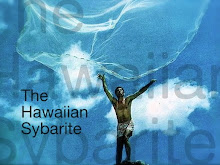Monoi is reputed to mean "sacred oil" in reo-Tahiti, the Tahitian language. While there are no linguists here, we can write with confidence on the qualities of the product itself; Monoi smells heavenly.
Created from the Tiare (Gardenia Taitensis), the national flower of Tahiti where it grows in luxuriant profusion, and Copra oil, Monoi was previously reserved solely for the chiefly class, the Ari‘i. Now, the term "Monoi oil" is a protected Appellation of Origin which requires Monoi to be manufactured in Tahiti of Tahitian materials under strict, specific conditions. The involved production of Monoi requires that at least 15 unopened Tiare flowers be mascerated in each liter of refined Copra oil for a period of at least 15 days.
Monoi has the mysterious ability to reduce the signs of aging—something about stimulating collagen production and improving microcirculation through hydration, we've been told. Whatever the reason, it works.
When Captain James Cook arrived in Tahiti, he observed Tahitians using the oil in myriad circumstances, both sacred and profane.
Monoi was used to lubricate the skin of newborns and to prepare the bodies of the recently deceased for their transit to the afterlife. Tahitians carried Monoi in their va‘a (outrigger canoes) on their jaunts to Hawai‘i and Aotearoa so that their mariners could protect their skin from the elements and dehydration; divers used it for the same reason, and still do.
To the original Monoi formula has been added new ingredients, including: flowers Pitate (Pīkake/Arabian Jasmine), Santal (Sandalwood) and Tipanie (Plumeria/Frangipani); sunscreen/UV filters; and iodine (to accentuate the appearance of a suntan).
Our advice? We're traditionalists and so we are partial to the original Monoi formula, but if you prefer a subtly exotic yet more discreet and masculine fragrance, we suggest Monoi Santal. If you must try something different, both Tipanie and Pitate are mostly inoffensive, but in our opinion they're no improvement over the classic Monoi.
Avoid Monoi Rouge with iodine as well as Monoi products with an SPF factor and use a proper sunscreen instead. If you happen to burn, Monoi will help to relieve the pain and heal the skin. And speaking of pain, cosmetics company Nars is marketing an attractive 4 oz. bottle of classic Monoi—for over seven times the price of its Tahitian import siblings.
We should also suggest passing-over Monoi Coco (Coconut). While not offensive, it is a gourmand scent, which is the problem. If you do choose to slather Monoi Coco over your nubile flesh don't be surprised if a bartender adds crushed ice, a pineapple wedge and a cocktail parasol to your décolleté, since you'll smell oddly similar to a Piña Colada.
Monoï Tiki Tahiti brand Monoi Oils ($7.59) are available at Longs Drug Store, Ala Moana Center, 1450 Ala Moana Boulevard, Honolulu Hawai‘i,(808) 941-4433.
Additional stockists include:
Whole Foods Market, 4211 Waialae Avenue, Honolulu Hawai‘i, 96816-5340, (808) 738-0820
Monoi Tiare Tahiti
Monoi was used to lubricate the skin of newborns and to prepare the bodies of the recently deceased for their transit to the afterlife. Tahitians carried Monoi in their va‘a (outrigger canoes) on their jaunts to Hawai‘i and Aotearoa so that their mariners could protect their skin from the elements and dehydration; divers used it for the same reason, and still do.
To the original Monoi formula has been added new ingredients, including: flowers Pitate (Pīkake/Arabian Jasmine), Santal (Sandalwood) and Tipanie (Plumeria/Frangipani); sunscreen/UV filters; and iodine (to accentuate the appearance of a suntan).
Our advice? We're traditionalists and so we are partial to the original Monoi formula, but if you prefer a subtly exotic yet more discreet and masculine fragrance, we suggest Monoi Santal. If you must try something different, both Tipanie and Pitate are mostly inoffensive, but in our opinion they're no improvement over the classic Monoi.
Avoid Monoi Rouge with iodine as well as Monoi products with an SPF factor and use a proper sunscreen instead. If you happen to burn, Monoi will help to relieve the pain and heal the skin. And speaking of pain, cosmetics company Nars is marketing an attractive 4 oz. bottle of classic Monoi—for over seven times the price of its Tahitian import siblings.
We should also suggest passing-over Monoi Coco (Coconut). While not offensive, it is a gourmand scent, which is the problem. If you do choose to slather Monoi Coco over your nubile flesh don't be surprised if a bartender adds crushed ice, a pineapple wedge and a cocktail parasol to your décolleté, since you'll smell oddly similar to a Piña Colada.
Monoï Tiki Tahiti brand Monoi Oils ($7.59) are available at Longs Drug Store, Ala Moana Center, 1450 Ala Moana Boulevard, Honolulu Hawai‘i,
Additional stockists include:
Whole Foods Market, 4211 Waialae Avenue, Honolulu Hawai‘i, 96816-5340, (808) 738-0820



No comments:
Post a Comment